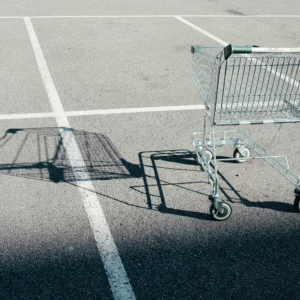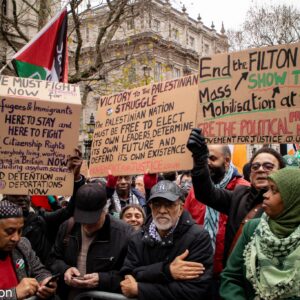Source >> People & Nature blog
Almost a year has gone by since I carried out this action. During that year, I pictured this moment time and again, the moment when I would be given the opportunity to make my final statement. I agonised over the words I would say, and the motives that drove me to act as I did.
During the last sitting, your honour, you asked whether I regret my actions. I understood that the extent of my professed regret would influence the severity of the sentence. But if I renounced my beliefs, I would be acting against my conscience.
On the contrary, during the time I have been in prison, I have seen first-hand the injustices perpetrated against the people who we call our brothers: both prisoners of war who have served in the Ukrainian armed forces and ordinary Ukrainian citizens.
The war – or whatever term we use to label it – came to their homes, destroying their lives as they knew them. No matter what slogans and geopolitical interests we use to varnish this, in my eyes it can not be justified.
Do I regret what has happened? Yes, perhaps I’d wanted my life to turn out differently – but I acted according to my conscience, and my conscience remains clear.
Rather than reflecting on who is right and who is guilty, I would like to pose this question: what did each of us do to stop this nightmare? What, ten or fifteen years from now, will we tell our children and grandchildren about these troubled times?
Unfortunately, God has not granted me the joy of fatherhood; the people who were closest to me have gone, and I am left alone with myself. It was easy for me to do what I did, even though I was well aware of the consequences. There was no-one to agonise about my fate, no-one to worry about me, or to cheer me on. But what I really did not expect was the huge number of letters and messages of support that I have received.
People have written from every corner of Russia, and not only Russia. Many were grateful for my position, so completely at odds with the notion of unanimous national support for what is being perpetrated. There were so many messages of encouragement: “stay strong”, “don’t despair”. So many warm words, so much sympathy.
But I’ll be so bold as to read just one part of a letter that I received in May, which really touched me, and pushed me to write this final statement to the court. Here it is:
“There is very little left of everyday life. It turns out that we can’t live everyday lives any more. I am listening to the memoirs of prisoners from the 1930s, 40s and 50s. Right now I’m on the breathtaking biography of [the actress] Tamara Petkevich [who spent seven years in a prison camp]. She was arrested in 1943, and lived until 2017. When they came for her she was only 22 – just a girl, half the age I am now. I have not read Solzhenitsyn’s Gulag Archipelago,and I never got round to Shalamov’s Kolyma Tales either. But now I’m listening to Petkevich, and it’s making me realise that this is exactly what we must listen to, what we must read at school. As a country we are obsessed with the past, but we hardly ever think about the present or the future. The Americans have their American dream: something to strive for. We have nothing but a fixation on that which happened long ago, that which can not return. But time and again we try to bring back what has passed, and these attempts are absolutely pointless. It’s as though the whole country is stuck in the mud. As individuals we are caught in our feelings. It’s terrible that even now, for as long as we stubbornly turn our heads back, we will never live happily, never the way we want to. Let’s hope people can find happiness in the little things.”
You can support Igor Paskar by sending letters:
□ Address: Russia 344022, Rostov-on-Don, 219 Maksim Gorky street, SIZO-1, Igor Konstantinovich Paskar (d.o.b. 1976).
□ You can send letters on line via the volunteer service RosUznik.
Solidarity Zone gives full support to Igor Paskar. His legal representative is Felix Vertegel.
Note. Letters sent to Russian detention facilities that are not in Russian are unlikely to be delivered to prisoners, and Rosuznik is also a Russian-language service. If you send short messages to Igor via Solidarity Zone supporters in the UK at 2022ukrainesolidarity@gmail.com, we will arrange for them to be translated and passed on.
□ More about Solidarity Zone on Facebook and telegram. A report of the organisation’s work in May is here. Links to more information in English here. Russian original of Igor Paskar’s statement here.
Art (55) Book Review (127) Books (114) Capitalism (68) China (81) Climate Emergency (99) Conservative Government (90) Conservative Party (45) COVID-19 (46) EcoSocialism (60) Elections (83) Europe (46) Fascism (64) Film (48) Film Review (69) France (72) Gaza (63) Imperialism (101) Israel (130) Italy (46) Keir Starmer (56) Labour Party (115) Long Read (42) Marxism (49) Marxist Theory (47) Palestine (186) pandemic (78) Protest (154) Russia (343) Solidarity (152) Statement (50) Trade Unionism (144) Ukraine (351) United States of America (140) War (371)
Latest Articles
- Tesco Boss wrings hands about joblessEconomic inactivity is not a mystery. It is the predictable result of the economy our corporate and political elite chose to build writes Simon Pearson
- Why Fascism happenedAllan Todd reviews Nuremberg (2025) directed by James Vanderbilt and starring Rami Malek and Russell Crowe. Available on all main streaming channels
- The money behind FarageSimon Pearson exposes the big money donors behind far right Reform UK and the links with Epstein
- Palestine Action: A political victoryToday the High Court ruled that the proscription of Palestine Action under terrorism legislation is unlawful – although the ban remains in place for at least another week, reports Jessica Mackenzie
- Review: The POUMThe POUM: Republic, Revolution and Counterrevolution by Andy Durgan, reviewed by Liz Thompson.






